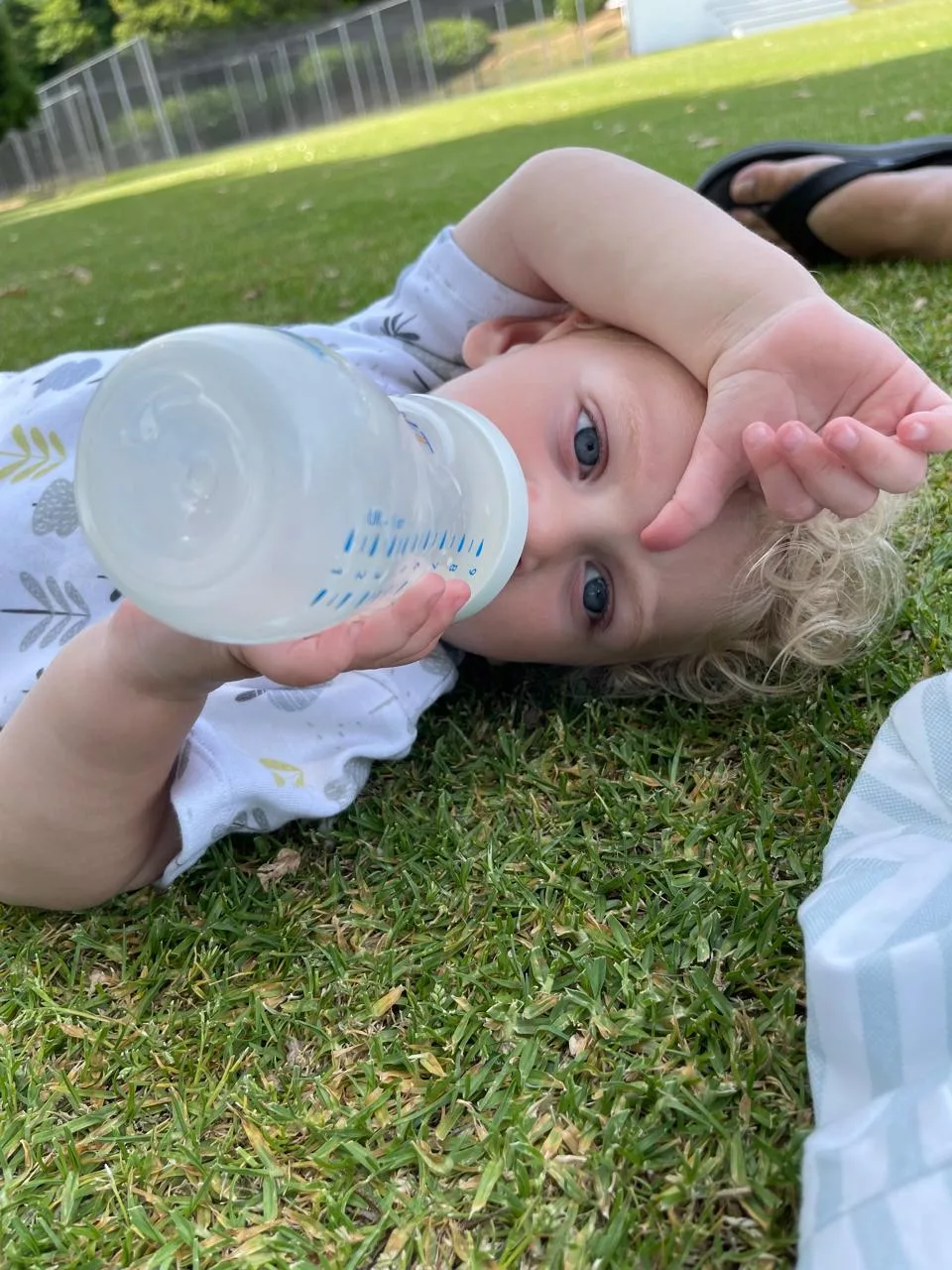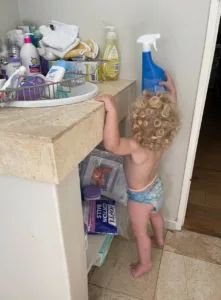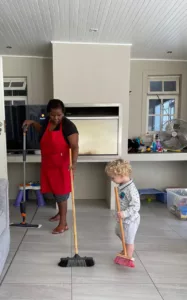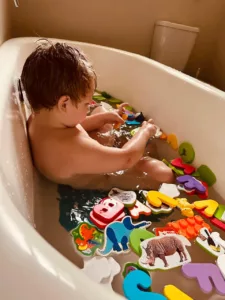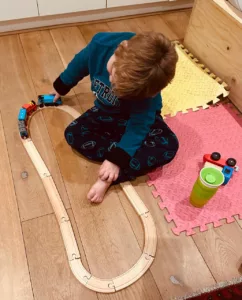I’m not the world’s best or most experienced parent by a country mile, but I know a thing or two about the premature removal or termination of comfort items, so I hope you can learn something from our experiences! The key lesson to be learned here, can be summed up quite succinctly: Don’t remove any comfort item before your neurodivergent child is ready for it.
Our kiddos attach themselves to all sorts of things. And those attachments are profound. Many of their comfort items are associated with transitions they find hard to cope with: Waking up, changing diapers or clothing, meal times, nap time, outings, bath time, and falling asleep. Their stuffies, and blankets, and pacis become essential to the smooth running of many of these routines. There are tears and tantrums when these items are withheld, broken, or damaged. God forbid, they get lost! Because finding the same exact items years down the line can be extremely challenging, expensive, and sometimes impossible! Associations are STRONG on the spectrum. So my best advice is to buy three or four of whichever toy your kiddo becomes most attached to. You never know when you’re going to need a backup!
While lost comfort items are a big fear for many, the next level up from that is needing to move your child on from something they love because they’ve outgrown it or have become too reliant on it. The first item that comes to mind is a paci, because at a certain age sucking one starts to affect their teeth. The American Academy of Pediatric Dentistry (AAPD), agrees non-nutritive sucking is normal for babies and young children and recommend weaning from the pacifier by age 3. It’s believed that throwing out that paci before age 3 reduces your child’s risk of dental malocclusions. But pacis are one of the hardest comfort items to withhold because children are hardwired to be calmed and comforted by nursing. A lot of moms feel forced to quit them cold turkey and oh boy, does almighty hell breaks loose! You’ll see a side of a child you may not have seen before. You may even experience aggression, and that’s because they’re struggling so hard to emotionally regulate without them. And no matter how good your reasons are for denying your child their comfort item, it’s heartbreaking to watch them spiral each day or night without it. The good news is that if you stay the course, and don’t give in, eventually they adapt! But how soon that might be depends on the individual child.
Aidan was never much interested in stuffies or pacis. He prefers “cause and effect” toys that “do something” and has been rejecting pacis from just a few weeks old! But he’s always been very attached to pillows and to his bottles. Pillows are an easy comfort item to provide him, and I’ll never find myself needing to track down a particular one, thank goodness! But his bottles were by far his biggest love, and greatest emotional regulator. No matter how dysregulated, a bottle would normally sort him out. The gentle draw of milk formula from the teat seemed to calm even the worst mood or behaviours. It was so soothing, that Aidan would fall asleep on a bottle every night, and it would be the only thing to lull him back to sleep during his frequent night wakings. But it did mean that he was drinking far too much formula for a child his age, and his bottles were the reason he was carrying extra weight. Aidan’s paediatrician, OT, gastroenterologist, and paediatric neurologist, all told us to wean Aidan off his bottles as soon as possible. He was drinking up to six a night which was affecting his sleep, appetite during the day, and contributing to his high growth rate. When Aidan began his program at two years old, his ABA service provider piled on and told us we needed to wean him as a priority. So we set about trying to reduce the number he was drinking, with a view to eliminating them completely.
At the age of two, Aidan was drinking several bottles within a 24-hour period. He was offered one during the day if he was in a meltdown so bad, nothing else was working. Our service provider was critical of this because we were rewarding adverse behaviours and also deepening his dependency on his bottles, which we could see and accept was not ideal. He also had one had supper time, in order to calm him down long enough for us to wolf down our dinner before needing to be on the move behind him until his late bedtime. And finally he had another, bigger bottle to fall asleep on, followed by between four to six very small bottles overnight. The bottle he fell asleep on was critical, because without it, Aidan would refuse to go to sleep and stay awake screaming at fever pitch for hours. He’d finally pass out from exhaustion long after midnight, and his functioning would be hugely affected the next day. The overnight bottles were also quite essential to him at that time, because they were the only things that soothed him back to sleep during his frequent wakings overnight. Without them he was properly awake and wanting to get up for the day at 3/4am. It was clear that a significant intervention was needed, so I tried my best to tackle it all head-on. The arduous journey to weaning Aidan off his bottles is detailed in my upcoming blog, “Bottles”, so for now I’ll just describe what happened once we managed to eliminate them altogether.
Looking back, I see now that we took Aidan’s bottles away long before he was emotionally or mentally ready to do without them. The backlash was immediate and severe. By taking his bottles away, we changed a major detail in his nighttime ritual and routine, causing him massive anguish, and also removed the one item that gave him comfort enough to sleep, causing sleeplessness on a new level. He was also so traumatised by the entire process, that he experienced a significant behavioural regression in the evening time. From the time he got off his program at 4pm, to the time he screamed himself to sleep at 10pm, Aidan was in and out of meltdown. Those meltdowns were accompanied by significant aggressions, some of which became targeted as the days, weeks, and months rolled on. We went from peaceful evenings to hell-on-earth every night, and each weekend, simply because we’d prematurely removed his preferred comfort item. Of course, with the challenges stacking up, and knowing I’d need to wean him one day anyway, I was really reluctant to give in and go back to bottles to get some peace, because we’d done so much work over so long to reach the point we were at now. But truthfully, we never expected the level of adverse behaviours we’ve experienced from February through till now! It has been absolutely mind blowing. I became more and more anxious and concerned when it looked like something I’d undertaken to do for his own good, had booted us into a “new normal” that was beyond exhausting and unpleasant. After weeks and weeks of Aidan screaming and me crying, I was forced to adapt. I somewhat organically became unresponsive to meltdowns, no matter how ferocious. I just kind of disassociated, until the meltdown was done and then went back to cuddles and games with him. And though it’s not the most ideal way to strengthen oneself for this journey, it’s a baptism-by-fire that I feel will stand me in good stead when Aidan cruises into typical – and atypical – four-year-old behaviours. They’re not called the ‘Fearsome Fours’ for nothing after all!
I suppose though… I do still feel that if I’d not been pushed into it by so-called experts, I would’ve allowed Aidan the comfort of his bottles a good while longer. In truth, they weren’t doing him enough harm to merit what we are going through now! So I hope our account is a cautionary tale to any other moms out there who feel forced to ignore their instincts and do as the professionals suggest. Don’t, if your child isn’t ready. Your mother’s intuition is sound and you need to learn to trust it, despite all the input you get from others as a special needs mom. There’s no harm whatsoever in waiting a bit longer. It doesn’t matter at all what other people think at the end of the day, because they’re not living your life. Be guided by your baby. Because although your doctors and therapists are autism-by-the-book experts… only you are the expert in your own child.
